We live in a violent society. I think that’s as close to a truism as anything can be. Mass shootings are a fact of life in America, and they happen with a sickening regularity. Gun violence takes a very heavy toll, and violent crime has spiked since the pandemic – specifically, homicides over the course of 2020. It was, of course, a year of exceptions, though many pundits and prognosticators have claimed that the increase is largely the result of police going into a kind of defensive crouch in the wake of the murder of George Floyd and the subsequent uprising.
I’ve no doubt that police departments have pulled back. Some made a point of doing so after previous high-profile deaths of people of color in police custody. On the podcast Why Is This Happening?, Patrick Sharkey talks about the various factors behind this rise in violent crime. Less aggressive policing is one, but he makes the point that a lot of community-based services that contribute significantly to reducing crime were shut down during the pandemic.
This, in some ways, reflects the divide between right and left perspectives on how best to address crime. Not surprisingly to anyone who follows this blog, I come down on the left side of this question, and I do so with what I consider to be really good reasons.
Fighting Crime With Crime
The idea that, as a society, we should reduce crime by over-policing disadvantaged communities is cynical beyond belief. Yes, you can marginally depress crime by mass arresting people, throwing them in jail for long terms, harassing people of color, etc., but in so doing you do irreparable violence to entire communities. That in itself is criminal far beyond the level of anything you might hope to prevent.
Other approaches work better, frankly – mutual aid, community-based counseling and mentorship services, nutrition programs, housing support, direct aid to families and individuals, etc. They also build communities, not destroy them.
Dirty Harry Syndrome
The advocates for hyper-aggressive policing work to create the impression that cases like the murder of George Floyd are necessary by-products of the service police provide. Sure, goes the argument, occasionally someone gets killed who probably shouldn’t have died, but that’s the price you pay for having safe streets. Can’t make an omelet without breaking a few skulls … I mean, eggs, right?
There’s a visceral appeal to this argument – a kind of cathartic, give-them-what-they-deserve attitude that makes a lot of white people feel right with the world. There’s a reason why movies like Dirty Harry were big hits – it’s a very attractive narrative for people who don’t do a lot of thinking.
The Political Economy of Policing
Of course, we know that political careers are made on hyper-aggressive anti-crime politics. That’s true of everyone from your local DA to the President of the United States. It’s a lot easier to get taxpayers to pay for MRAPs and sophisticated weapons for the cops than it is to get them to fund after-school programs and free breakfast for kids of color. And even though aggressive policing is a bad solution to the problem of crime, it’s an easier sell for politicians than the much more effective and less destructive approach that involves supportive community services.
Let’s face it, there’s a lot of money in expanding the police/prison state, just like there was a lot of money in slavery. That’s why defund causes so much consternation – it hits them where it hurts. Very insightful on the part of BLM to work that out. We need to carry that knowledge with us as we seek real solutions to this dysfunctional system.
luv u,
jp


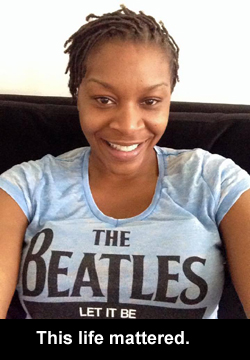 The video of this incident is chilling, and instructive. It is a window into the mentality of entrenched white domination of black people; nothing less than this. Irritation should not be sufficient cause for arrest, whether it’s being projected by the motorist or the arresting officer. Sandra Bland was not doing as she was asked. She was not bowing and scraping. At the same time, she was not violently confrontational. The Texas State Trooper could have just handed her the ticket – or a warning – and walked back to his cruiser. Once he decided to be a dick about it, there was no backing down – not as the white cop disciplining the black miscreant.
The video of this incident is chilling, and instructive. It is a window into the mentality of entrenched white domination of black people; nothing less than this. Irritation should not be sufficient cause for arrest, whether it’s being projected by the motorist or the arresting officer. Sandra Bland was not doing as she was asked. She was not bowing and scraping. At the same time, she was not violently confrontational. The Texas State Trooper could have just handed her the ticket – or a warning – and walked back to his cruiser. Once he decided to be a dick about it, there was no backing down – not as the white cop disciplining the black miscreant.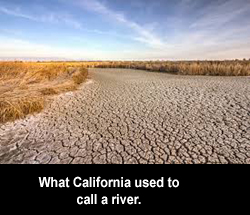 And yet, here we are, faced with enormous challenges, decades – even centuries – in the making. Problems like climate change, a matter so enormous most of us just turn away. For those of us who believe the overwhelming scientific consensus there is a human role in climate change, far too many feel that this is something that can be solved by driving a Prius and screwing in a few LED light bulbs. Those are good things, but this is not the type of challenge that is going to yield to small-bore actions carried out at a personal level. This will take a major reshaping of our economy, our use of resources, our entire approach to the Earth. Half measures won’t do it.
And yet, here we are, faced with enormous challenges, decades – even centuries – in the making. Problems like climate change, a matter so enormous most of us just turn away. For those of us who believe the overwhelming scientific consensus there is a human role in climate change, far too many feel that this is something that can be solved by driving a Prius and screwing in a few LED light bulbs. Those are good things, but this is not the type of challenge that is going to yield to small-bore actions carried out at a personal level. This will take a major reshaping of our economy, our use of resources, our entire approach to the Earth. Half measures won’t do it.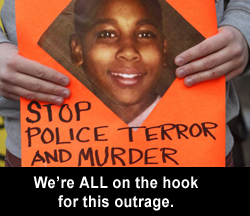 This is, however, an issue that isn’t going to be solved through police reform. Yes, dialing back police tactics is a necessary component, but it is just one element in a far more complex picture. Black Americans have been treated like shit since emancipation (prior to that as well, of course). Black life has been criminalized nine ways from Friday, starting with the virtual enslavement of African Americans in the post-reconstruction era (as chronicled by Douglas Blackmon in
This is, however, an issue that isn’t going to be solved through police reform. Yes, dialing back police tactics is a necessary component, but it is just one element in a far more complex picture. Black Americans have been treated like shit since emancipation (prior to that as well, of course). Black life has been criminalized nine ways from Friday, starting with the virtual enslavement of African Americans in the post-reconstruction era (as chronicled by Douglas Blackmon in 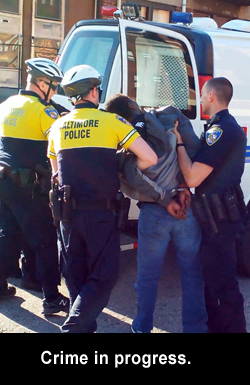 Monday night Baltimore was burning, in places. Tuesday morning, we heard all the usual stuff. Why are they burning their own neighborhoods down? What’s the matter with these people? Hey … they looted a liquor store? Same crap every time this happens. These, incidentally, are not the questions asked after every sports-related victory (or defeat) riot that happens in major American cities. Of course, those “thugs” tend to be mostly white people. They tend to belong to a more privileged class. Nothing to see here.
Monday night Baltimore was burning, in places. Tuesday morning, we heard all the usual stuff. Why are they burning their own neighborhoods down? What’s the matter with these people? Hey … they looted a liquor store? Same crap every time this happens. These, incidentally, are not the questions asked after every sports-related victory (or defeat) riot that happens in major American cities. Of course, those “thugs” tend to be mostly white people. They tend to belong to a more privileged class. Nothing to see here.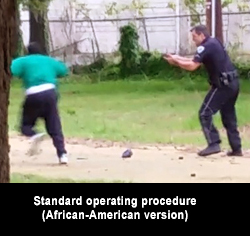 Of course, the North Charleston Police Department would likely have stuck to the police officer’s original story if the video hadn’t surfaced; that Scott had grabbed the officer’s taser, that he had posed a threat to the officer’s life, that the cops had administered CPR in some kind of timely fashion. Feidin Santana’s video put the lie to all of that, and in so doing, threw into question every official claim of following proper police procedures. Those initial reports sounded like what we heard after Michael Brown’s shooting. But then, so did the web cam video that captured the police killing of 12-year-old Tamir Rice. Has anyone gone to jail over that? Not yet.
Of course, the North Charleston Police Department would likely have stuck to the police officer’s original story if the video hadn’t surfaced; that Scott had grabbed the officer’s taser, that he had posed a threat to the officer’s life, that the cops had administered CPR in some kind of timely fashion. Feidin Santana’s video put the lie to all of that, and in so doing, threw into question every official claim of following proper police procedures. Those initial reports sounded like what we heard after Michael Brown’s shooting. But then, so did the web cam video that captured the police killing of 12-year-old Tamir Rice. Has anyone gone to jail over that? Not yet.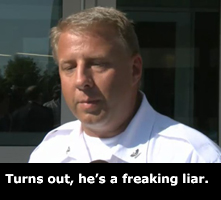 It comes as no surprise that Fox News and other gutter press outlets have latched onto this little tidbit about Wilson. That’s their form of “race card” journalism, playing to the more than sixty percent of white Americans who feel there is no racial component to this killing. But just as a thought experiment, let’s suppose for a moment that Wilson got slugged a few times by Brown – however unlikely that may be. A cop has the authority to use force in self defense. But six shots at a distance, at an unarmed man? And two to the head? How is that self-defense?
It comes as no surprise that Fox News and other gutter press outlets have latched onto this little tidbit about Wilson. That’s their form of “race card” journalism, playing to the more than sixty percent of white Americans who feel there is no racial component to this killing. But just as a thought experiment, let’s suppose for a moment that Wilson got slugged a few times by Brown – however unlikely that may be. A cop has the authority to use force in self defense. But six shots at a distance, at an unarmed man? And two to the head? How is that self-defense?